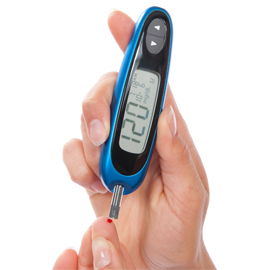 Type 2 diabetes is a chronic disease that affects how your body metabolizes glucose (sugar). With this type of diabetes your body will either resist the effects of insulin (the hormone that regulates the movement of sugar into your cells) or it won’t produce enough insulin to maintain healthy and normal glucose levels. You may feel like you’re fine with type 2 diabetes and symptoms may not be noticeable, but it can affect many major organs and could potentially be a life-threatening disorder.
Type 2 diabetes is a chronic disease that affects how your body metabolizes glucose (sugar). With this type of diabetes your body will either resist the effects of insulin (the hormone that regulates the movement of sugar into your cells) or it won’t produce enough insulin to maintain healthy and normal glucose levels. You may feel like you’re fine with type 2 diabetes and symptoms may not be noticeable, but it can affect many major organs and could potentially be a life-threatening disorder.
If you are obese or overweight, your chances of developing diabetes are greatly increased. Being overweight puts a number of different stresses on your body. The more fatty tissue you have, the more insulin resistant your cells will become. Studies have shown that 80 to 90 percent of all type 2 diabetes diagnoses have been in people who are struggling with obesity.
What Are the Symptoms of Type 2 Diabetes?
Symptoms of type 2 diabetes are slow to surface. An individual could go years without knowing that they have the disease. Possible symptoms include:
- Frequent urination and increased thirst
- Increased hunger
- Fatigue
- Blurred Vision
- Slow-healing sores and frequent infections
- Areas of darkened skin
If you notice any of the above symptoms, you should immediately consult a healthcare professional.
Treatment for Type 2 Diabetes
Treatment for type 2 diabetes requires lifestyle changes and a lifelong commitment to your health.
- Monitoring your blood sugar. It is very important to make sure that you are keeping your blood sugar levels within your target range. Your sugar levels can change unpredictably, so it is necessary that you learn to understand how your blood sugar will change in response to food, alcohol, medications, physical activity, stress or illness. All of these factors can affect your blood sugar level, so it is crucial that you frequently check and monitor your levels. Your doctor will help you decide how frequently you should do so.
- Diet and weight control. Your weight is a large factor when it comes to your diabetes treatment. You should work with your doctor to determine how much fat, protein and carbohydrates you need in your daily diet. Your doctor or dietician will find a diet plan that best works for you. Consistency is key with your new diet in order to not only lose weight, but to maintain proper blood sugar levels as well.
- Exercise and physical activity. This pairs with your new diet. Make sure you talk to your doctor before you start a new fitness plan. Exercise can lower your sugar levels, so you want to make sure that you are monitoring your levels before and after physical activity. Regular activity will help if you are obese or struggling with weight loss. It will also increase your energy levels, improve blood flow and help you manage your diabetes treatment.
- Diabetes medications and insulin therapy. Often when people are diagnosed with type 2 diabetes, doctors will prescribe a form of diabetes medication. This type of medication will increase your body tissues’ sensitivity to insulin and lowers glucose production in the liver. Other medications may work to lower your insulin levels in different ways. Your doctor will work with you to determine the right medication for you. Some people with type 2 diabetes also need insulin therapy. Because normal digestion interferes with insulin taken orally, it sometimes must be injected. Depending on your specific needs, your doctor may provide a mixture of insulin types to take throughout the day.
If you are struggling with obesity and you’ve just been diagnosed with type 2 diabetes, other treatment options may be necessary. You may want to consider medical weight loss or bariatric surgery if your body mass index (BMI) is greater than 35.
Type 2 diabetes is a serious and sometimes life-threatening disease. If you are struggling with or have been diagnosed with type 2 diabetes, then being proactive today and consistent with your treatments in the future, you can control your diabetes and remain in control of your healthy lifestyle.


